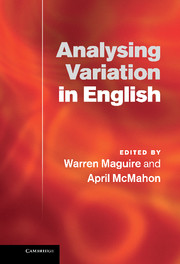Book contents
- Frontmatter
- Contents
- List of figures
- List of tables
- List of contributors
- List of abbreviations
- Introduction. Analysing variation in English: what we know, what we don't, and why it matters
- Part I Investigating variation in English: how do we know what we know?
- Part II Why does it matter? Variation and other fields
- 7 Variation and linguistic theory
- 8 Variation and change
- 9 Variation and forensic linguistics
- 10 Variation and identity
- 11 Variation and populations
- 12 Variation and education
- Notes
- References
- Index
9 - Variation and forensic linguistics
from Part II - Why does it matter? Variation and other fields
Published online by Cambridge University Press: 03 May 2011
- Frontmatter
- Contents
- List of figures
- List of tables
- List of contributors
- List of abbreviations
- Introduction. Analysing variation in English: what we know, what we don't, and why it matters
- Part I Investigating variation in English: how do we know what we know?
- Part II Why does it matter? Variation and other fields
- 7 Variation and linguistic theory
- 8 Variation and change
- 9 Variation and forensic linguistics
- 10 Variation and identity
- 11 Variation and populations
- 12 Variation and education
- Notes
- References
- Index
Summary
When a fact has to be impressed on a jury, the most effective method is to go on repeating it over and over, varying the wording, if possible, but relying on reiteration to do its work … The greatest advocates have not disdained to use this simple method to the full and have distinguished themselves from their less accomplished brethren by the variety which they could give to the performance.
Philbrick 1949: 5–6Introduction
Variation is crucial to our understanding of the language of individuals and groups. Through its study, we can find out about aspects of who a speaker is, where they are from, what they do, with whom they spend time and even with whom or what they affiliate. Many of these issues are of interest to the law. The police or courts might have a voice recording and a desire to know something about the identity of the speaker, for example. They might have a written police statement and a desire to know something about its situation of production. The police or courts might want information about the influence of the varieties which they themselves use for investigative work, such as interviews, or the varieties which they use for procedural work, such as explaining jury duties. Applying research about varieties to legal settings is exciting work. Such work with, on or for lay people or legal specialists provides opportunities to contribute directly to the operation of justice (Rampton 1992).
- Type
- Chapter
- Information
- Analysing Variation in English , pp. 199 - 218Publisher: Cambridge University PressPrint publication year: 2011

